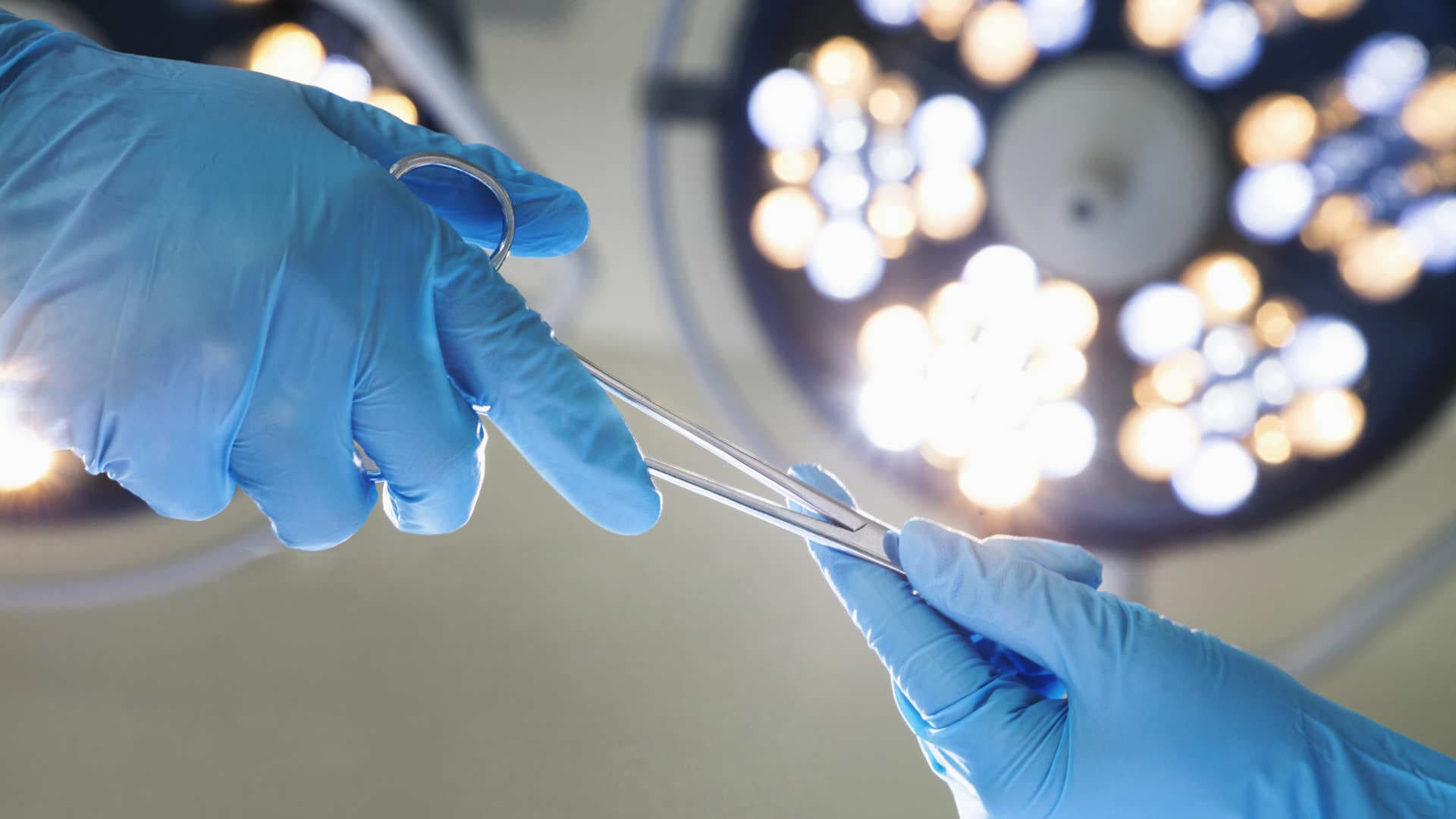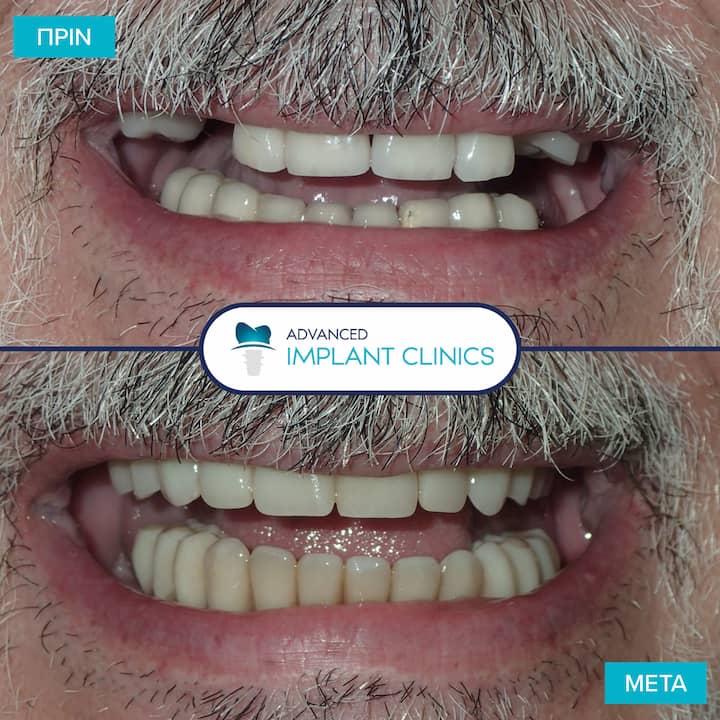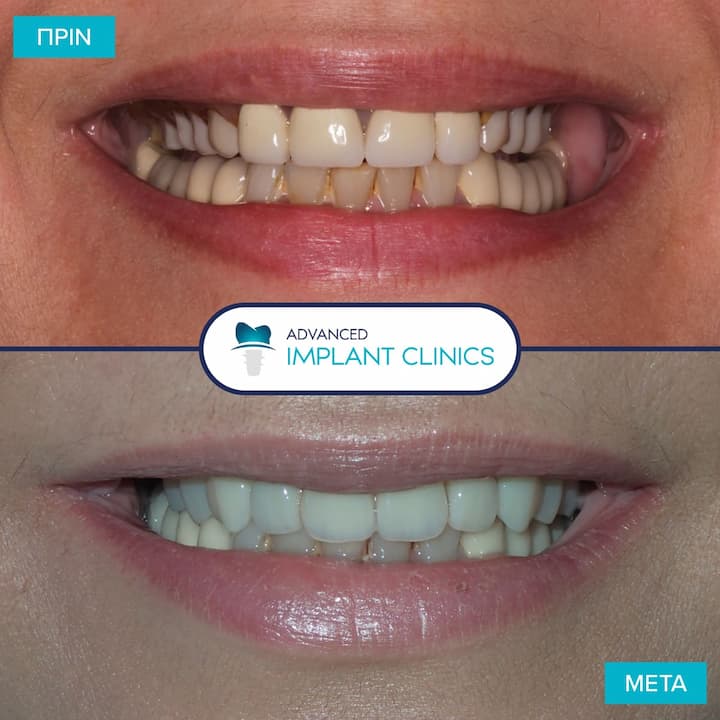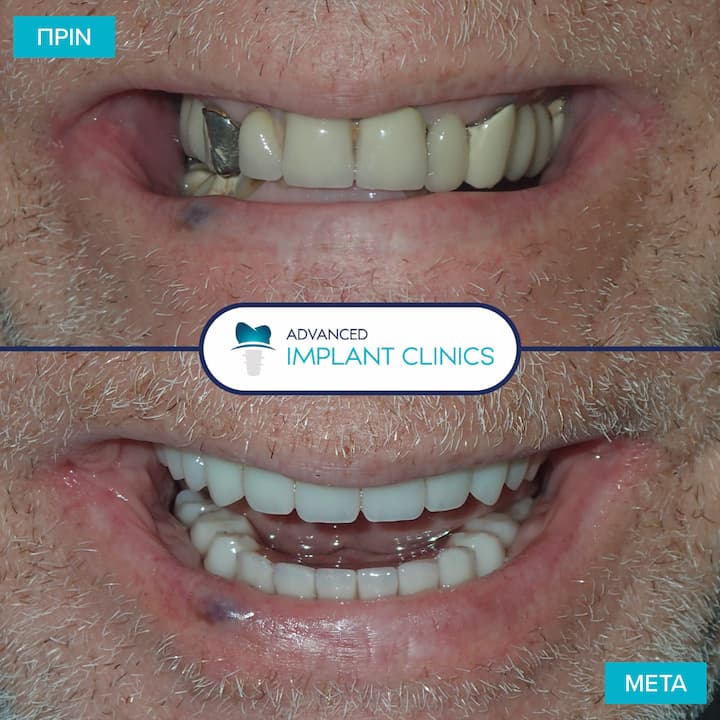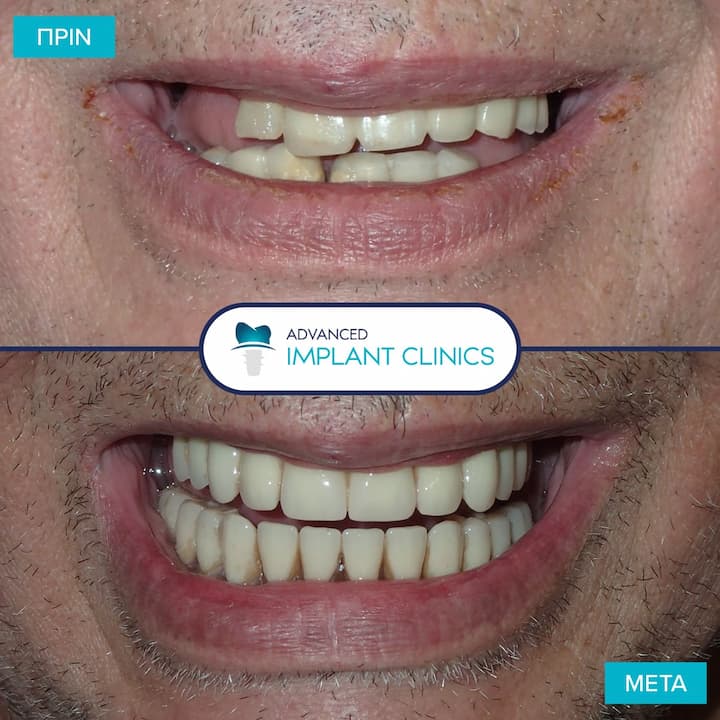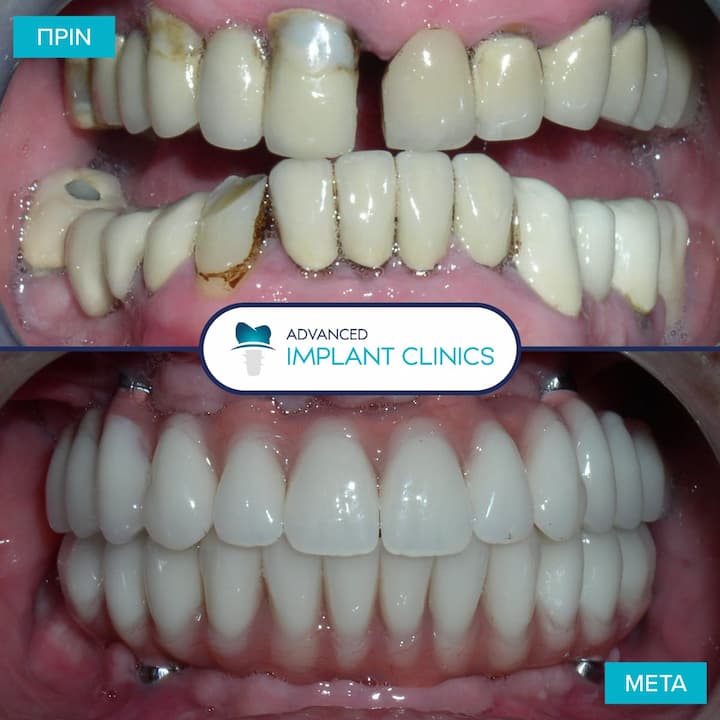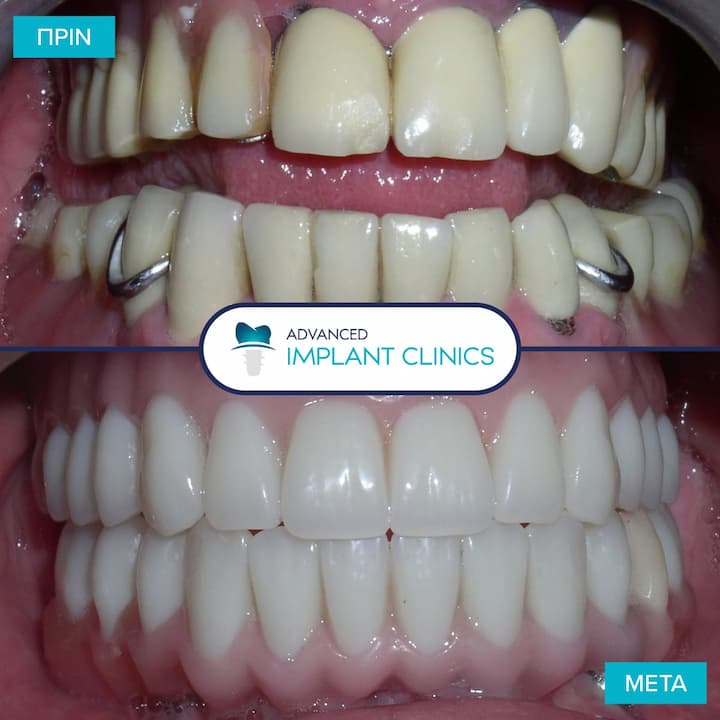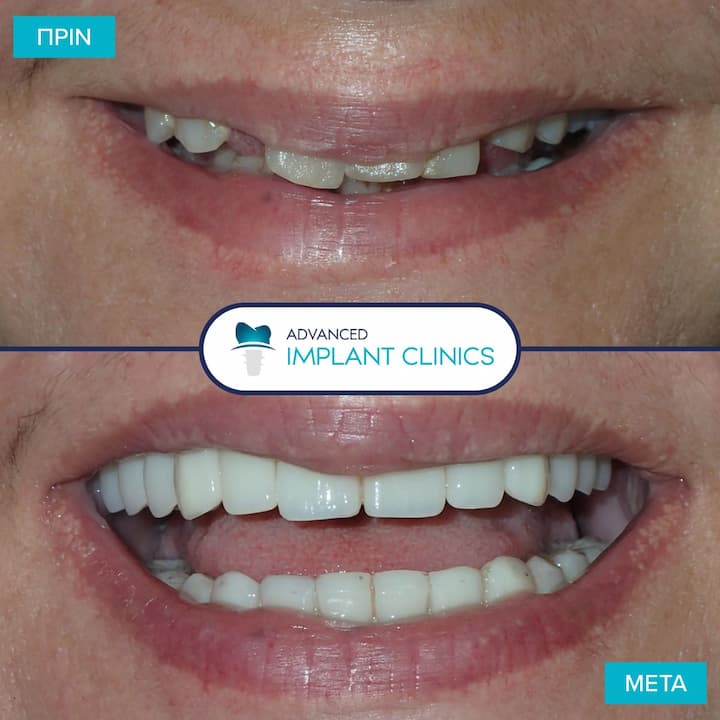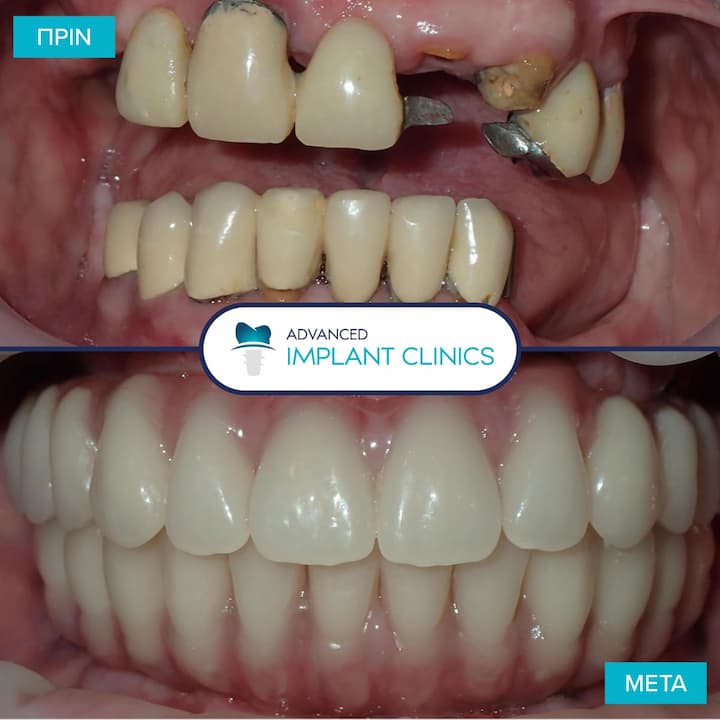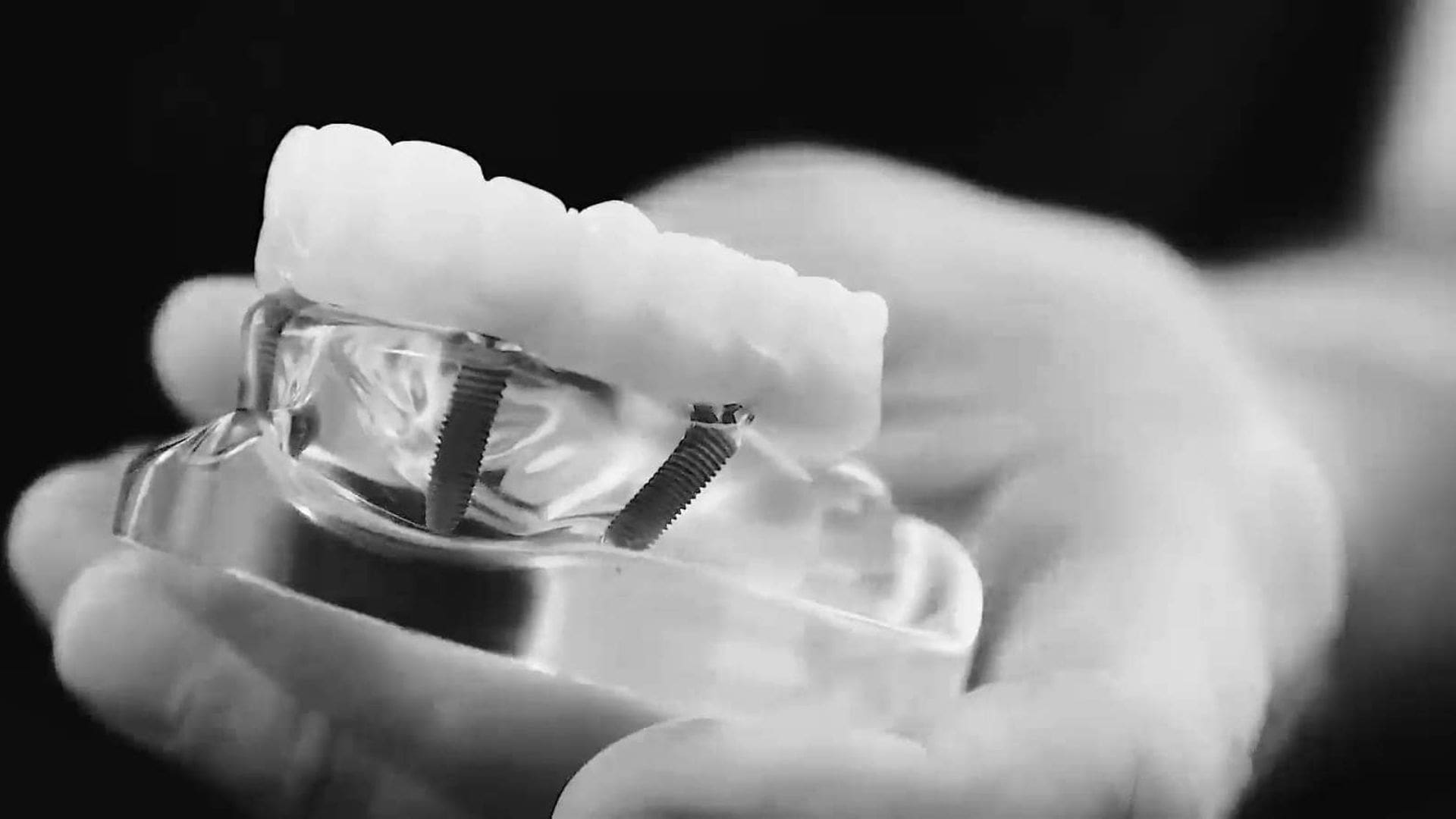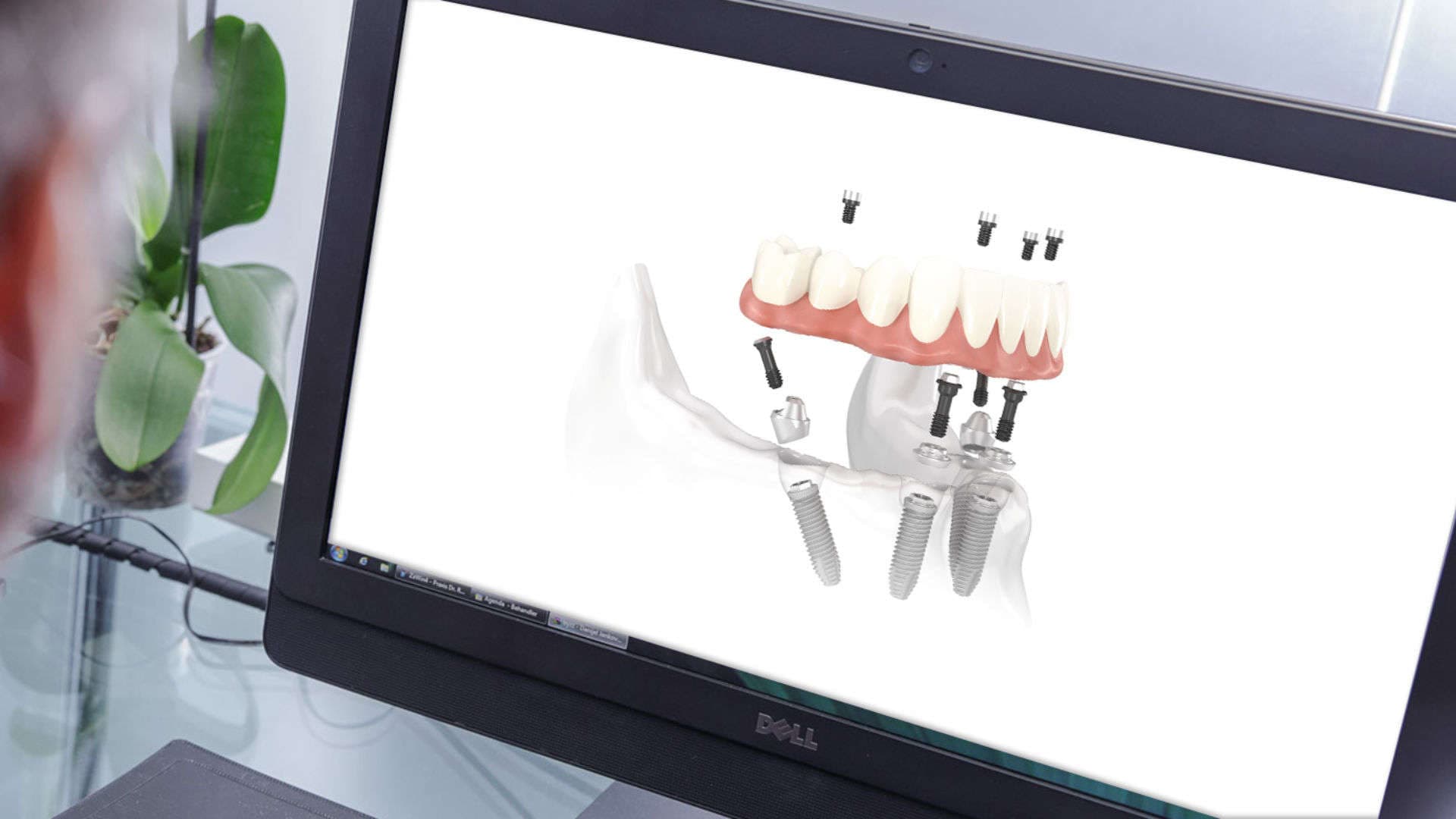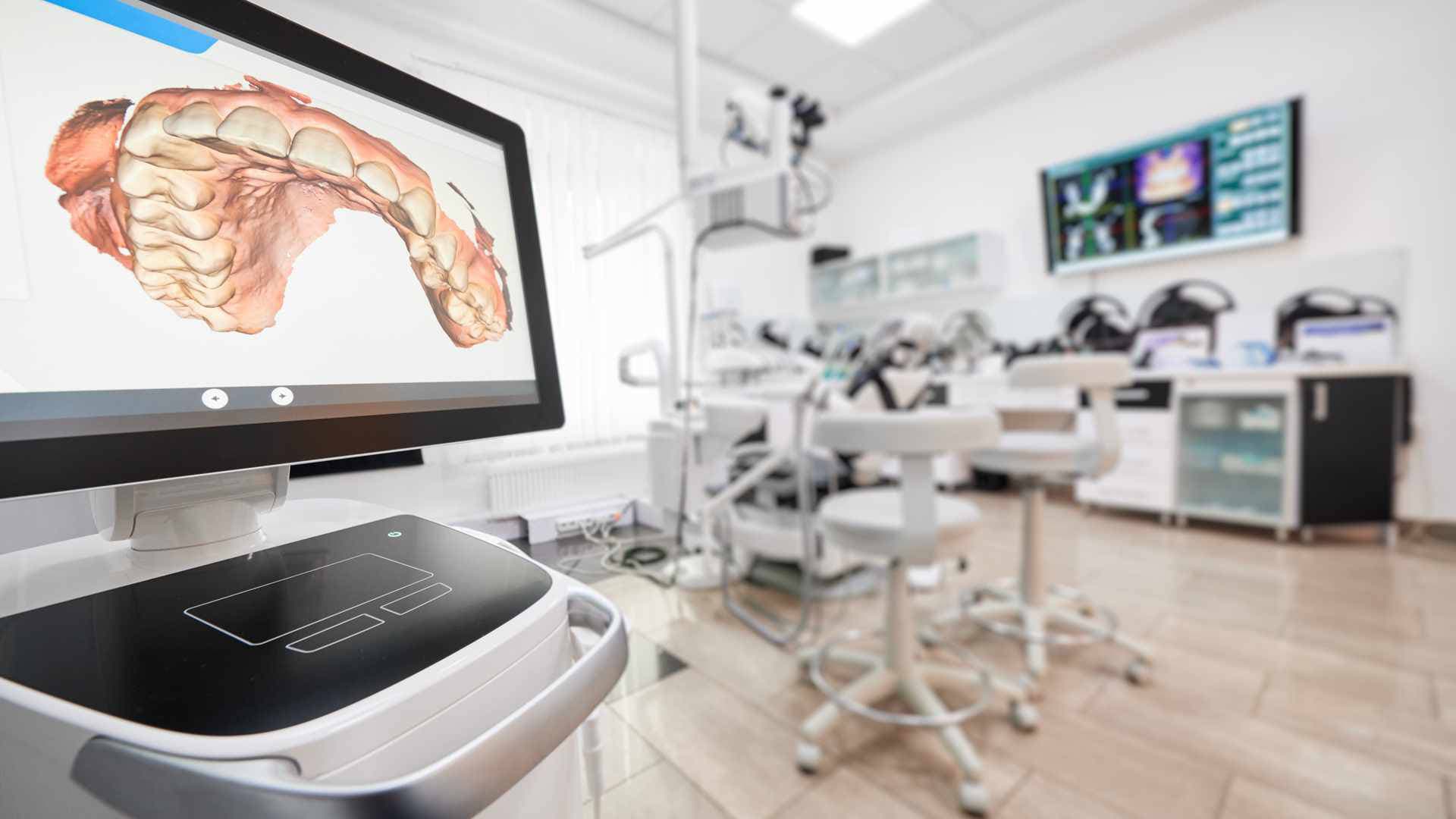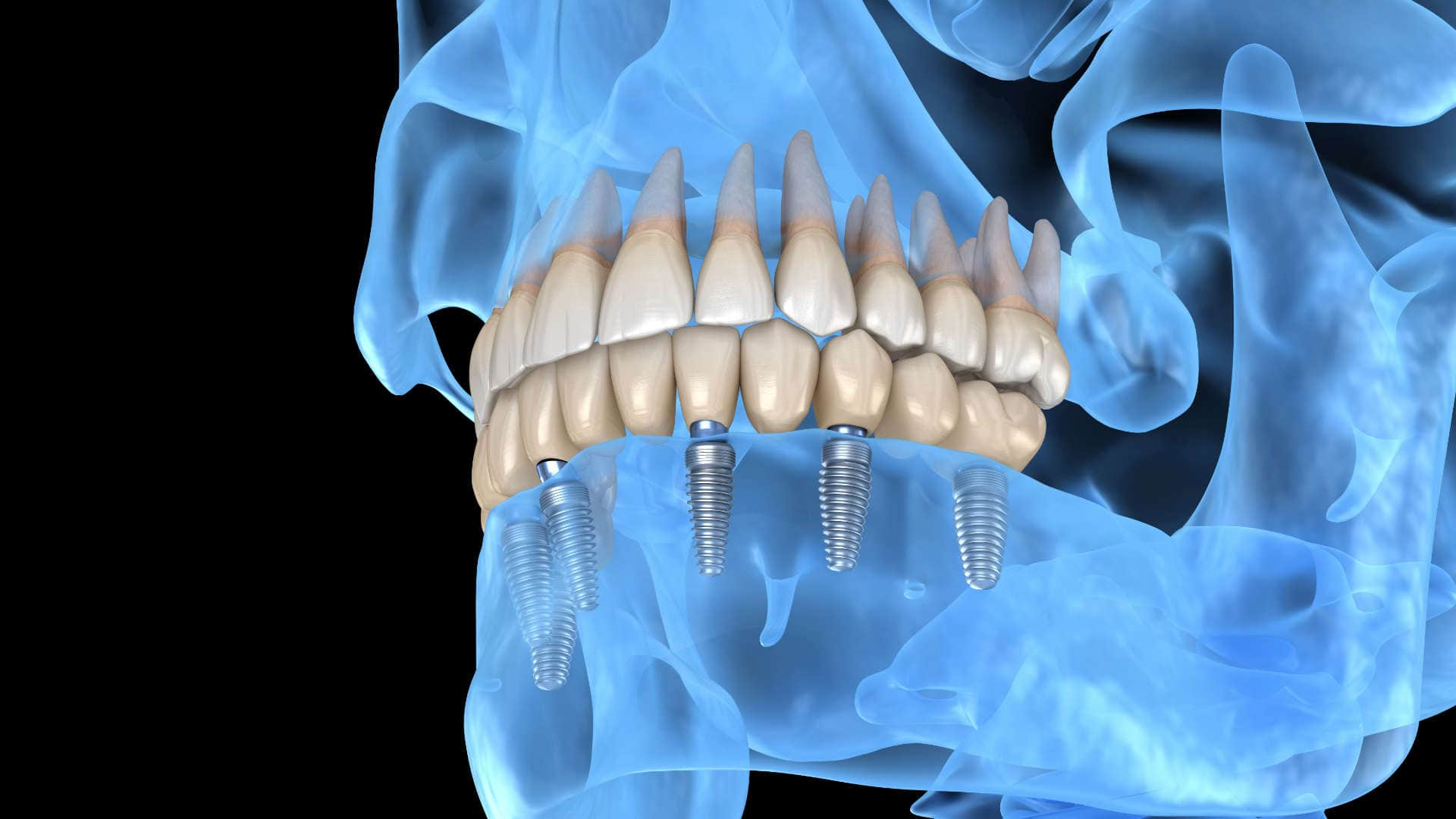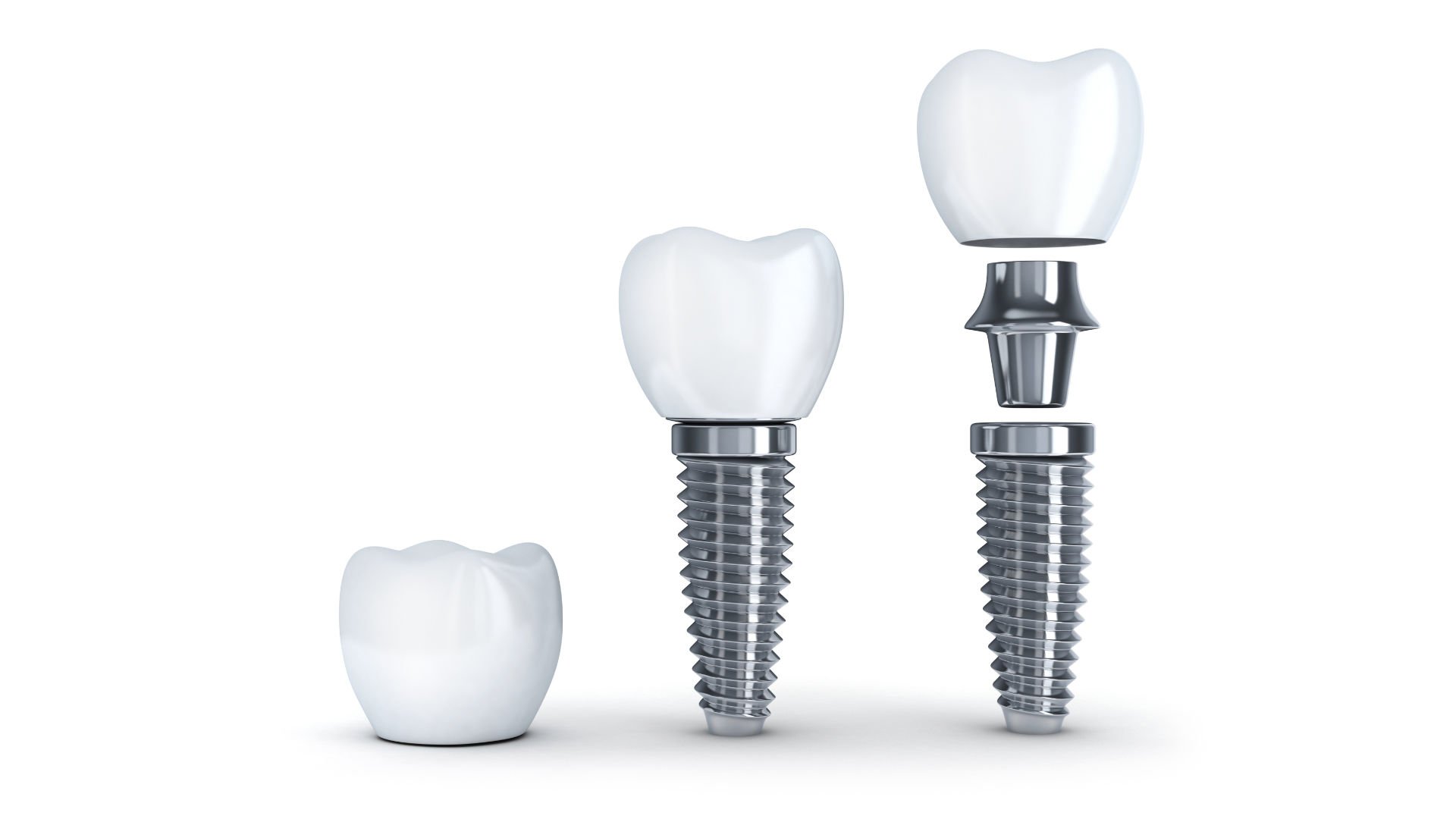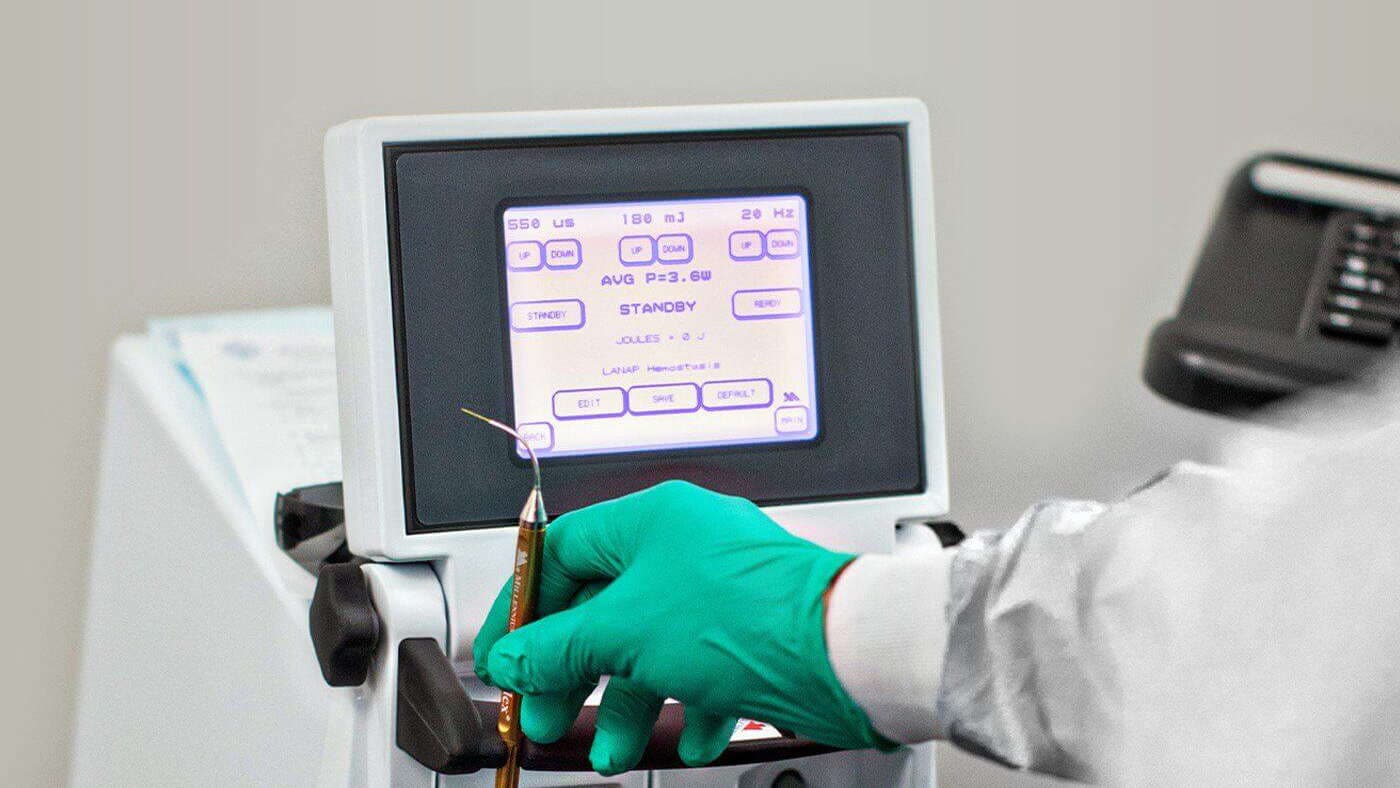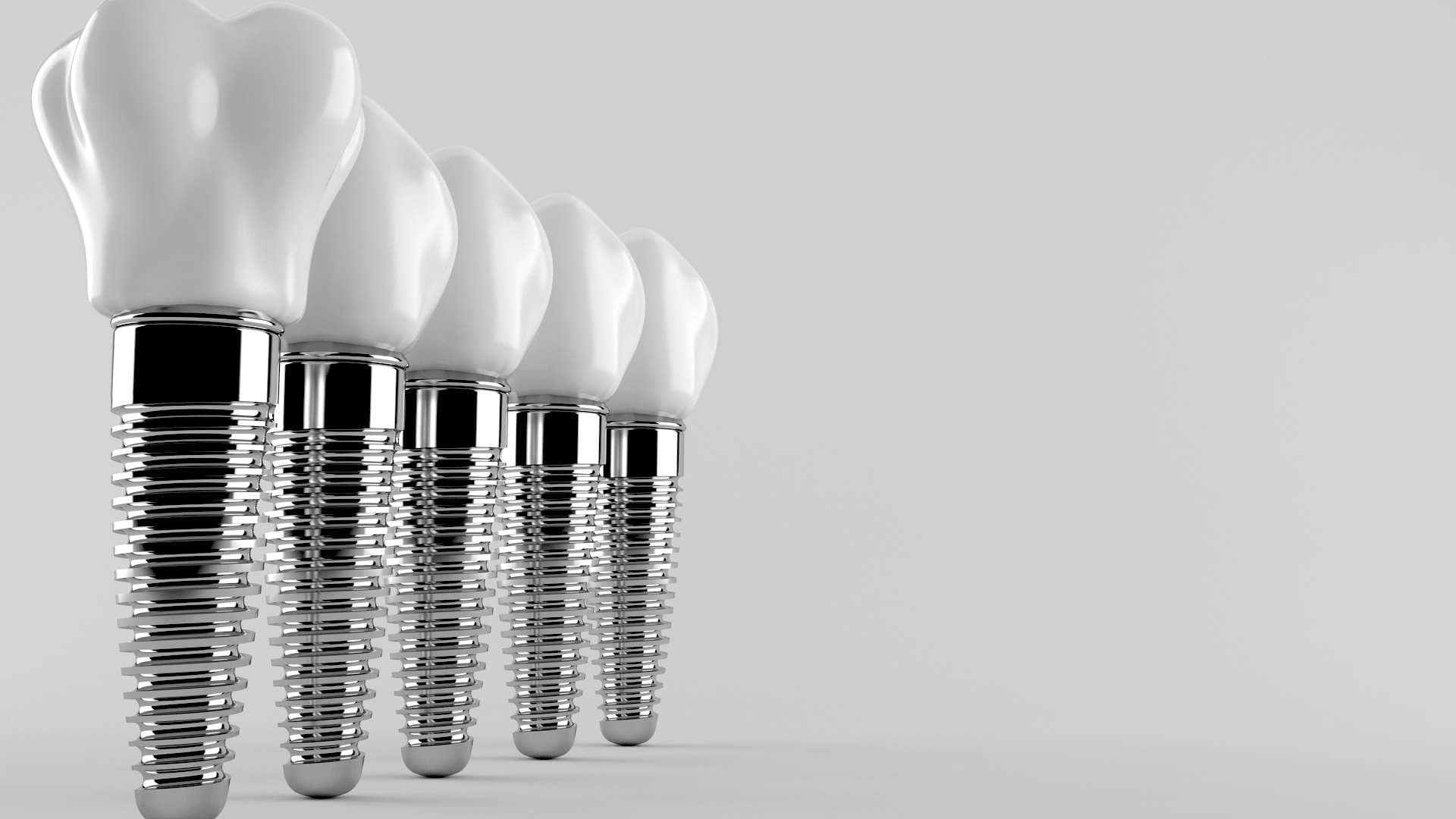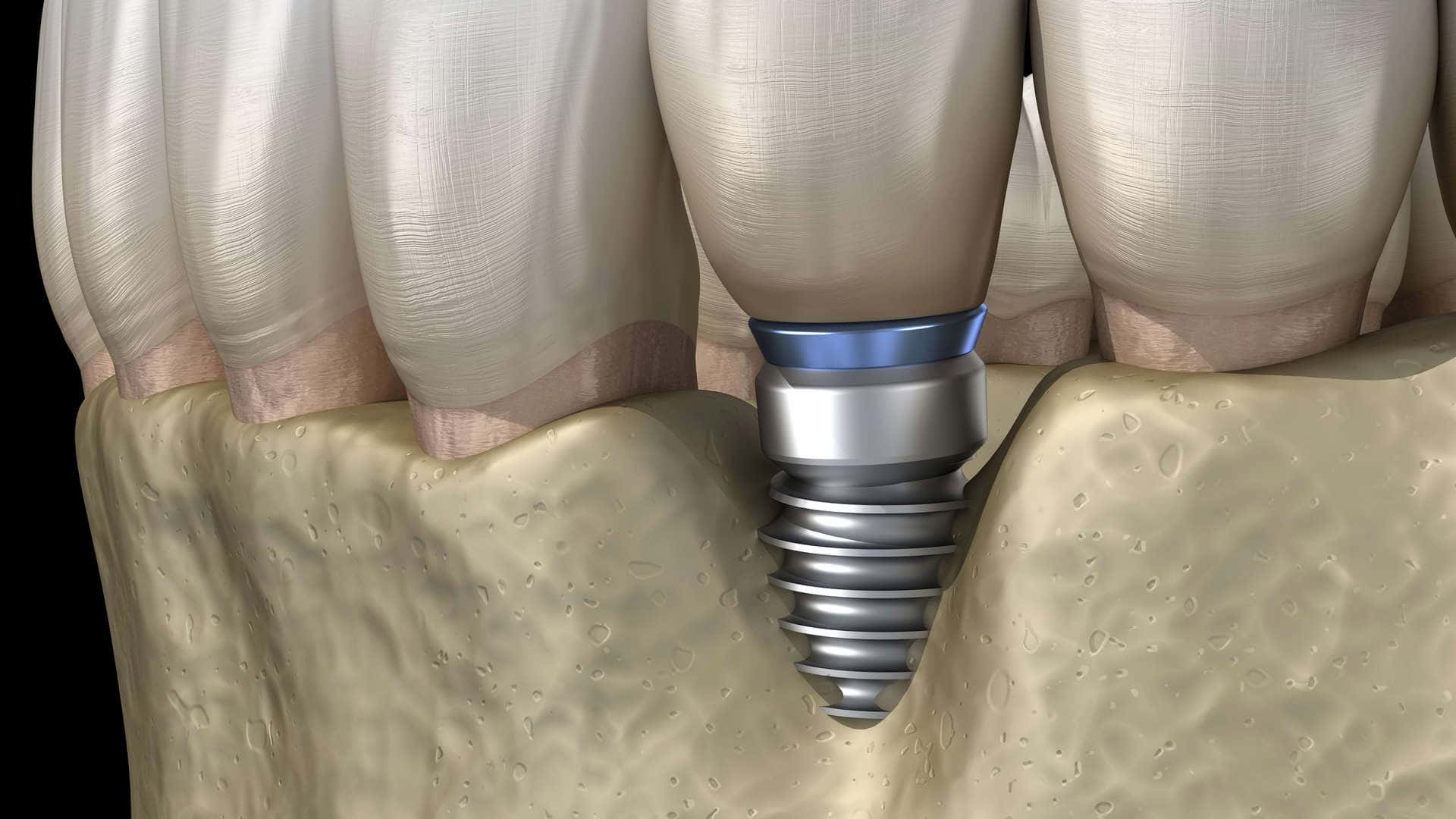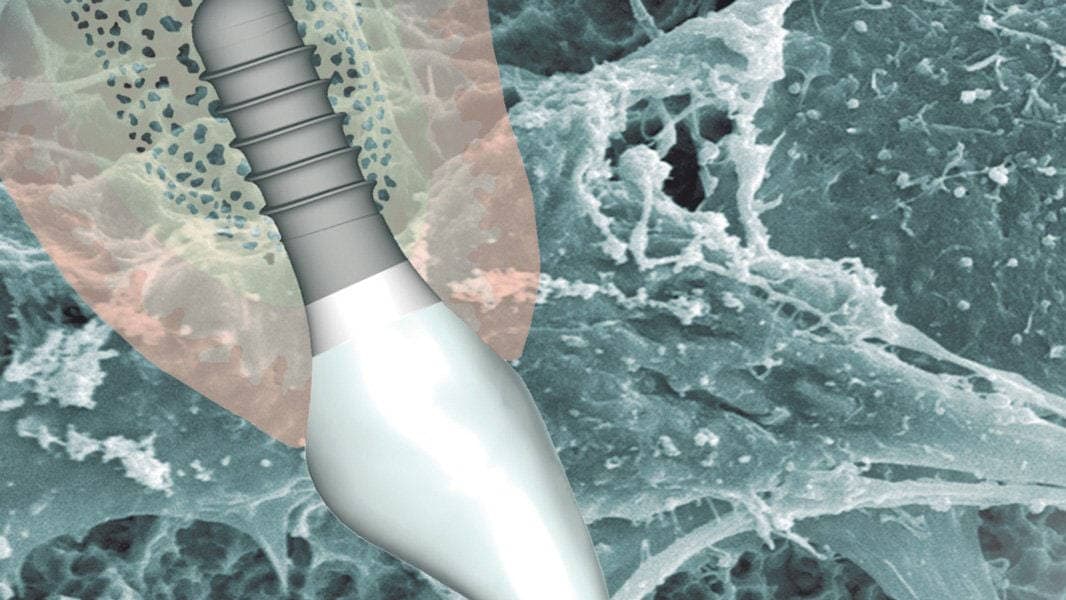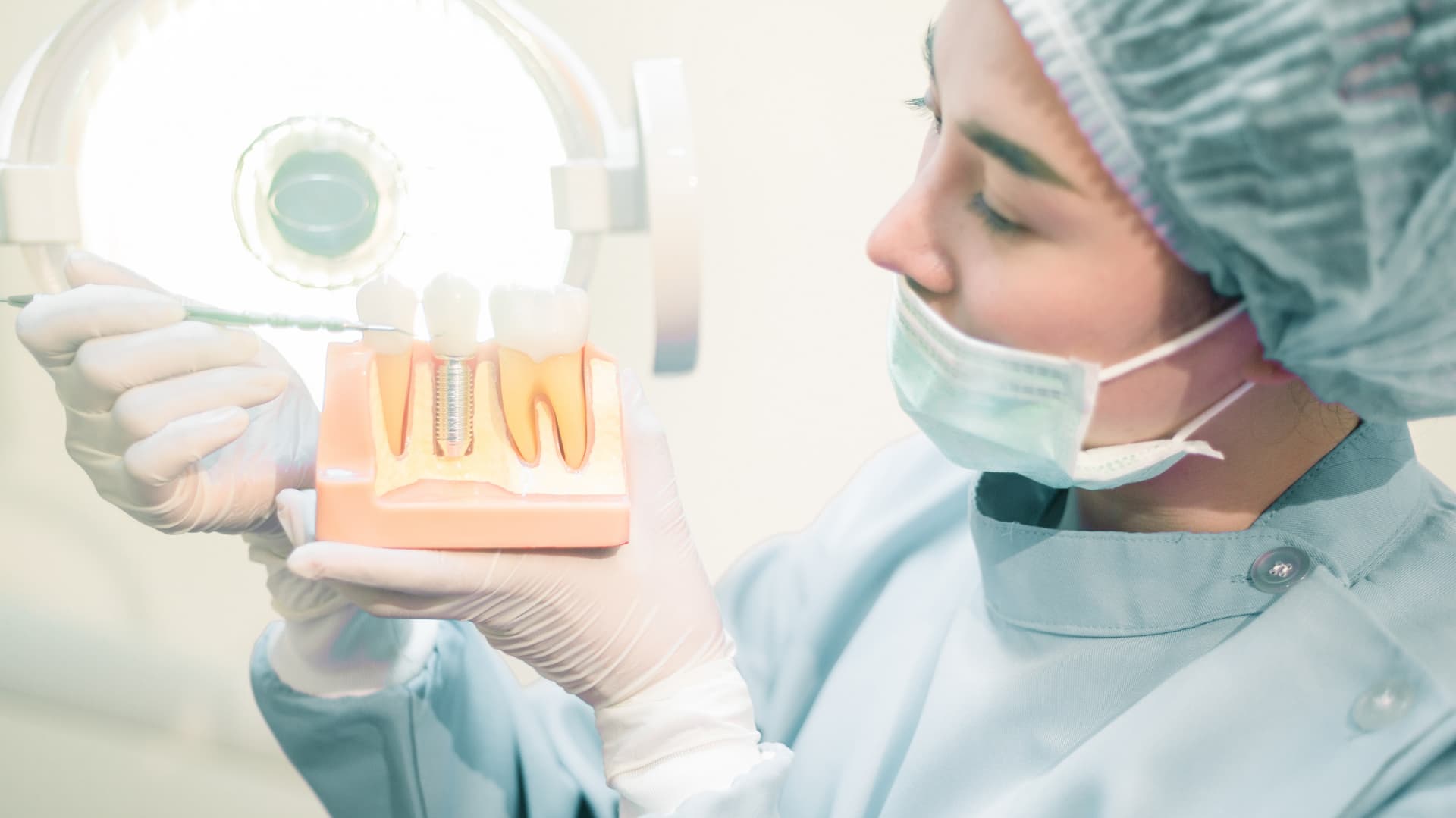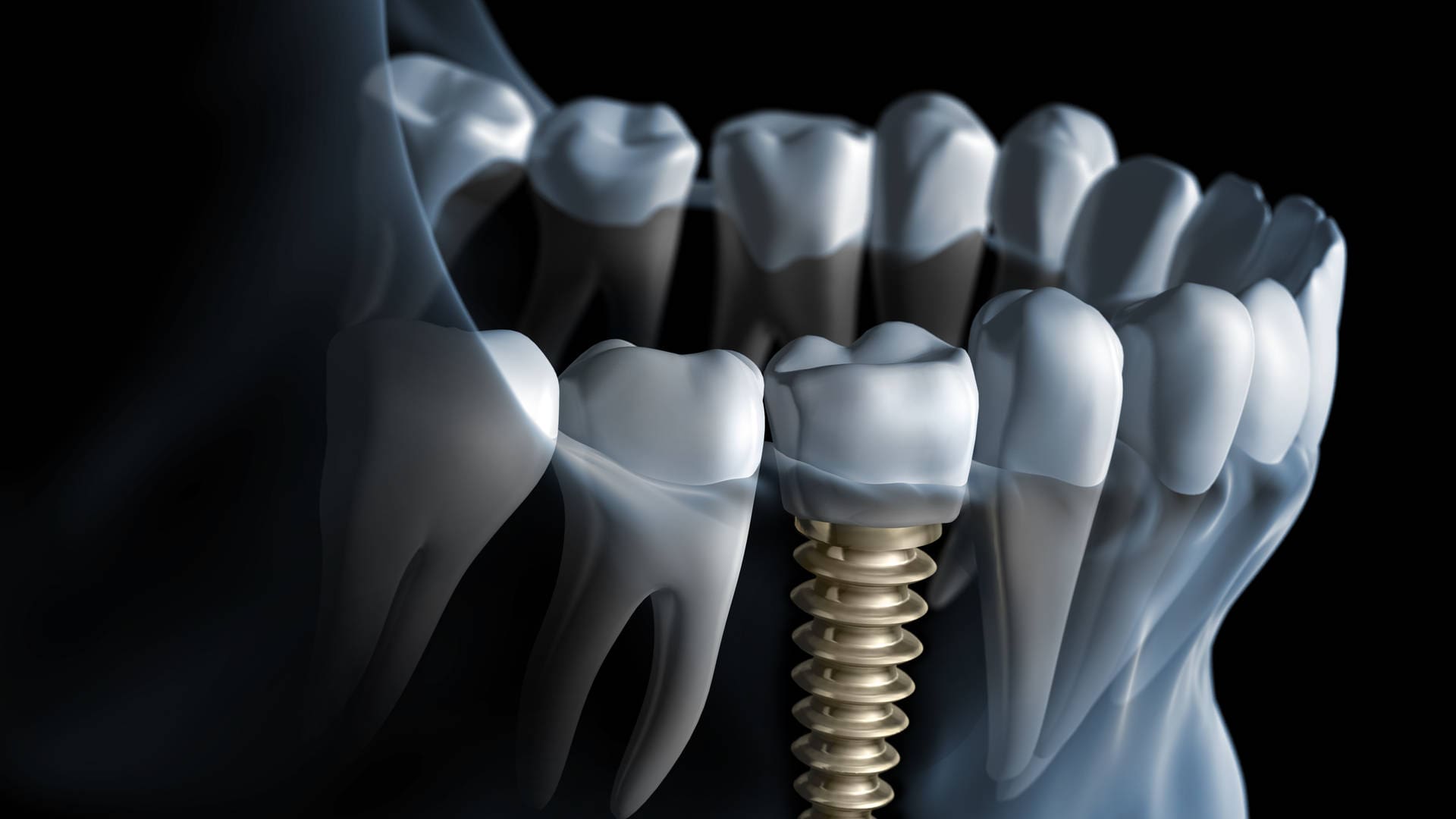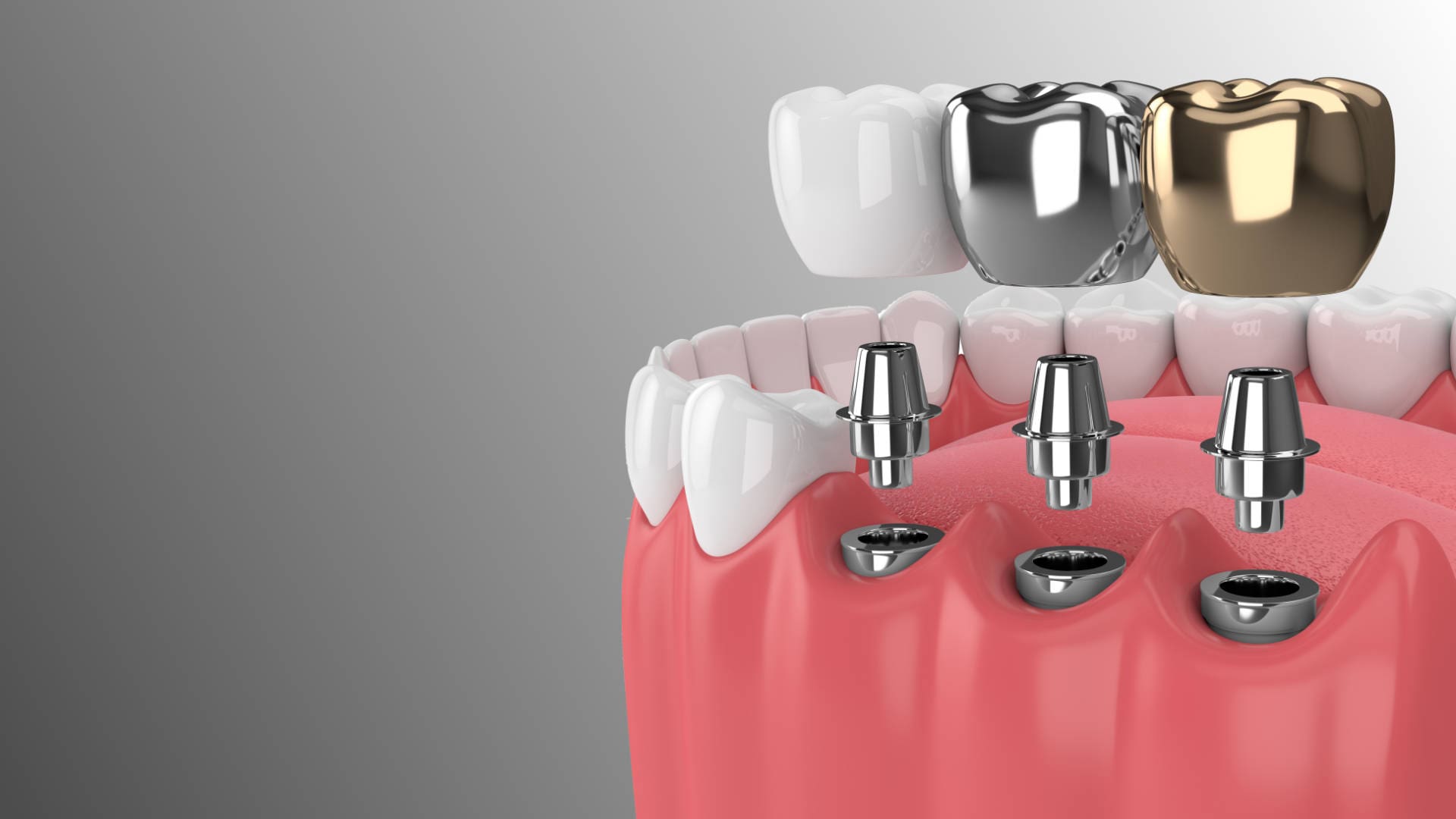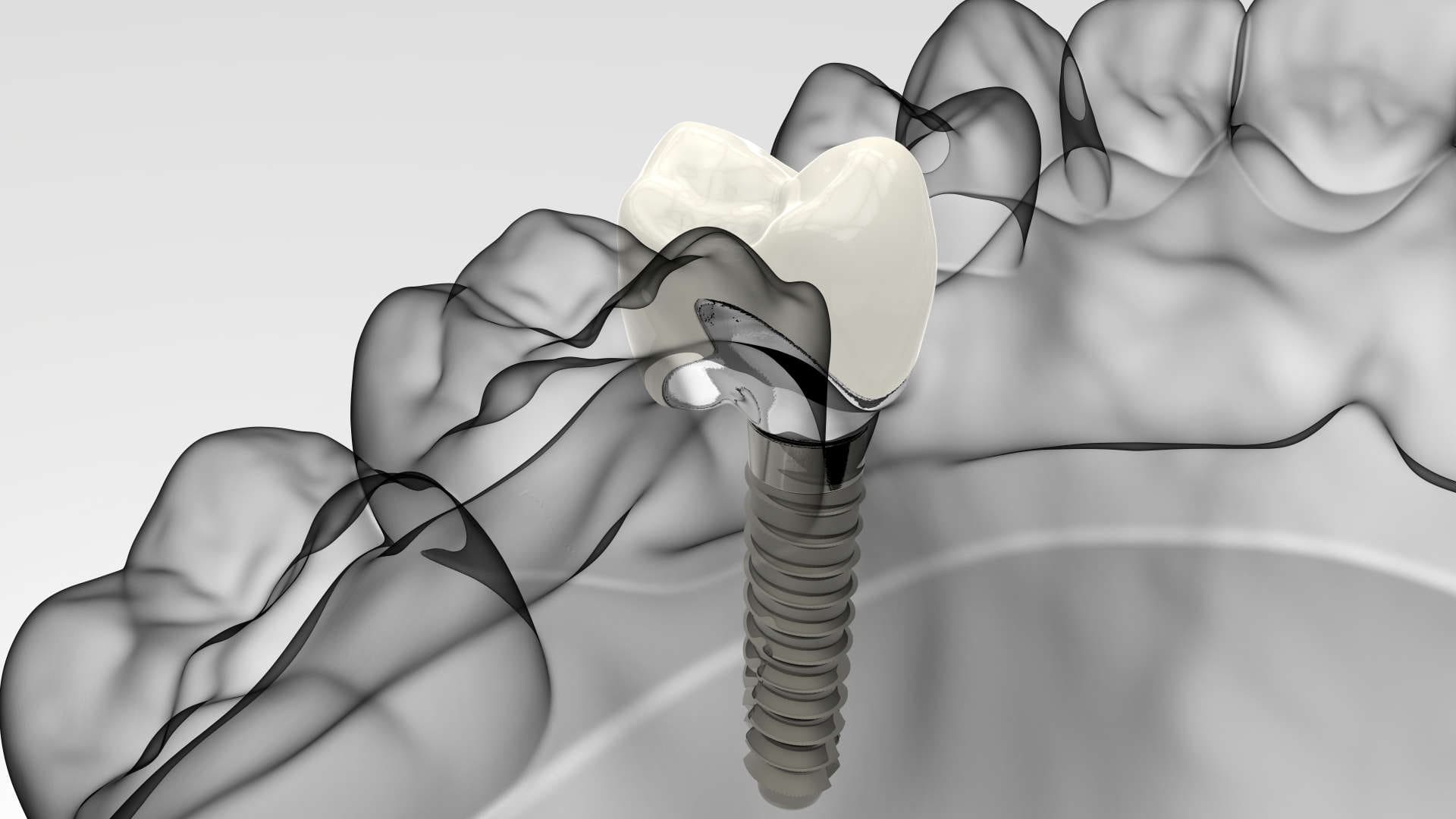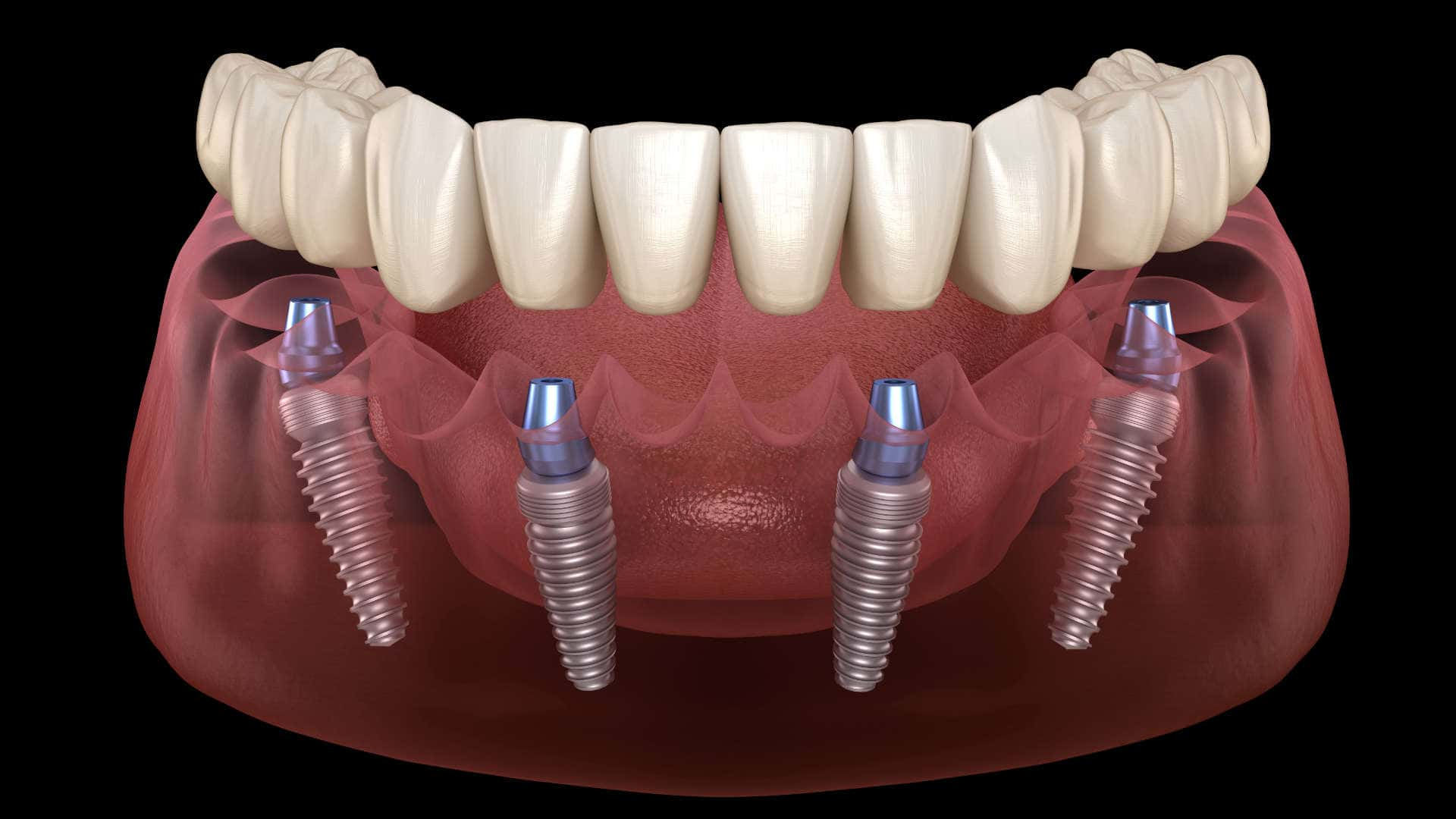What are dental implants
Dental implants, also known as teeth implants, are artificial teeth that look and function like natural teeth. Implants are often referred to as screw-in or implanted teeth because they replace natural tooth roots with artificial roots (metal screw-in cylinders) made of titanium. They are an excellent alternative to artificial dentures or tooth bridges that cause problems or do not fit properly, and they provide solutions when the absence of natural tooth roots makes the placement of fixed prosthetic work impossible.
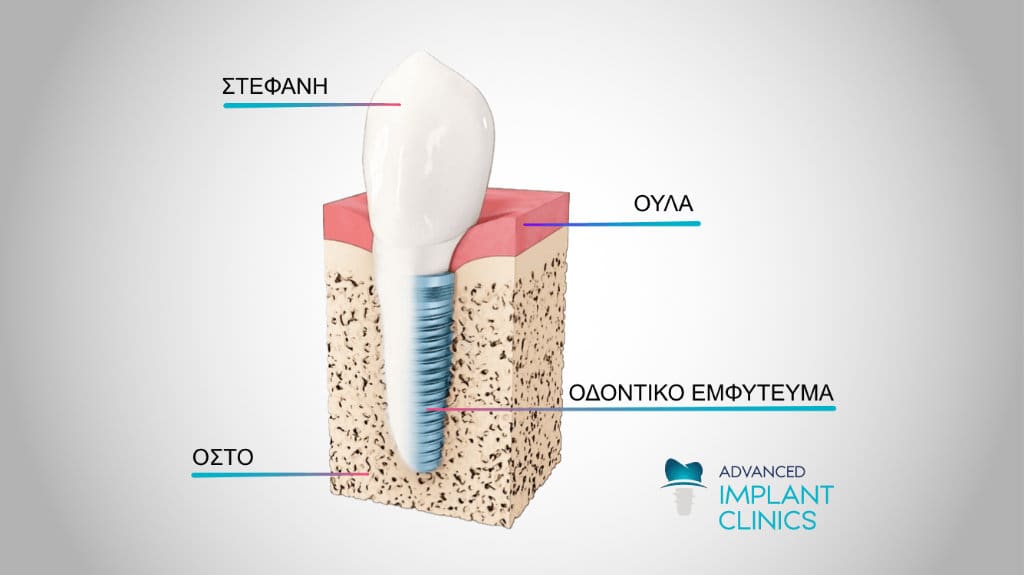
The method used to place the dental implant during surgery is determined by the type of implant and the condition of your jawbone. Implant placement may involve multiple procedures and stages, and modern implant technology now allows you to get teeth in one day with only four implants in cases where all of your teeth are missing. The most significant advantage of dental implants is that they provide a stable foundation for your new teeth without requiring the adjacent teeth to be ground down.
Before you go to the dentist, learn everything you need to know about dental implants.
Advantages and disadvantages of dental implants
You have many reasons to choose dental implants over other prosthetic solutions:
- They are used to replace missing tooth roots.
- They do not move and cause bone damage, as is common with bridges that rely on tooth roots.
- They cannot be damaged like natural teeth or cause jawbone damage due to the material they are made of.
- They do not require grinding down adjacent teeth that are intact or strong, as bridges do.
- They enhance the overall appearance.
- Nobody notices that your false teeth are not natural.
- They help with speech. Speech problems are caused by ill-fitting dentures. Furthermore, when you speak, you will be at ease and will not be concerned that your dentures will slip out of place.
- They boost self-esteem.
- Because implants function similarly to natural teeth, they improve both oral and physical health.
- Chewing is as easy as it was when you had your natural teeth.
- Time resistance, not wearing down like natural teeth.
- Avoiding the unpleasant task of removing removable dentures.
- Reduce dentist visits and discomfort caused by natural tooth wear and tear, with long-term financial and psychological benefits.
Implants clearly have no disadvantages over any other prosthetic work proposed to treat tooth loss.
See if you can get implants
Over 95% of patients who visit our clinic are candidates for safe implant placement. Generally, you can have implants placed if the following conditions are met:
- The growth of your jaw bones has been completed.
- You have lost one or more teeth.
- You have healthy oral tissues.
- There is sufficient bone to place a dental implant or it can be regenerated with bone grafts.
- You have no health problems that will interfere with bone healing.
- You are unable or unwilling to wear dentures or bridges.
- You want to improve your speech, chewing ability and facial aesthetics.
When you cannot have implants
Implant placement is contraindicated in some cases of patients with serious health problems such as,
- Uncontrolled diabetes mellitus.
- Have recently undergone chemotherapy.
- Have a compromised immune system.
- Advanced osteoporosis.
- Have recently had a serious heart attack.
- Suffer from growling (teeth grinding/clenching) and must be treated before implants are placed.
- They are heavy smokers.
These conditions can affect bone quality and the body’s ability to heal, as the tissues take longer to heal after the implants are placed.
In any case, at the first appointment you should inform the dentist of your medical history.
The preparation before implantation
Finding the ideal dentist is the most crucial and possibly the most challenging step in the entire implant process. It is important to choose a dentist carefully because, even if they use high-quality implants, an inexperienced dentist may not always achieve success. Several experienced dentists work together to plan the dental implant procedure:
- Oral surgeon. Medical professional who specializes in mouth, jaw, and face conditions. It is very different to be treated by a general dentist who has attended some implant placement seminars than by an implantologist who has done extensive studies and research in the field.
- Periodontist. He specializes in treating the gums and jaw bone, which surround the teeth.
- Prosthodontist. The prosthodontist designs and fits artificial teeth (crowns, bridges and dentures) over implants, taking into account the aesthetic appearance.
Before you make a decision, ensure that your dentist has the necessary expertise and experience. Alternatively, they may refer you to an experienced implant dentist for evaluation and treatment, often with a financial benefit (commission) to them, which raises the cost of your treatment.
Be sure to inquire:
- The specific course of treatment he suggests and its stages.
- What background does he have in the area?
- The overall cost of the procedure (from start to finish).
- Which options are available.
- Whether a certificate with a lifetime warranty is included with the implant.
- How he will participate in the process (if he refers you to an implantologist).
Ask for a second opinion if you are unsatisfied with the responses you have received. Since you’ll be investing a lot of time, energy, and money in the treatment, you should be sure you fully understand what you’ll get in return.
How many dental implants you need
The implant plan is customized to your situation and takes into account things like how many teeth you need to replace, the health of your jawbone, and the condition of your other teeth.
Dental implants can be used to replace one tooth, several teeth, all the teeth in your upper or lower jaw, or both. If you need to restore a full dental arch, you may be the perfect candidate for All On 4 full mouth restoration. Four implants will be inserted by the implantologist, and they will support a full denture.
Restoration Of The Entire Mouth With Four Special Implants
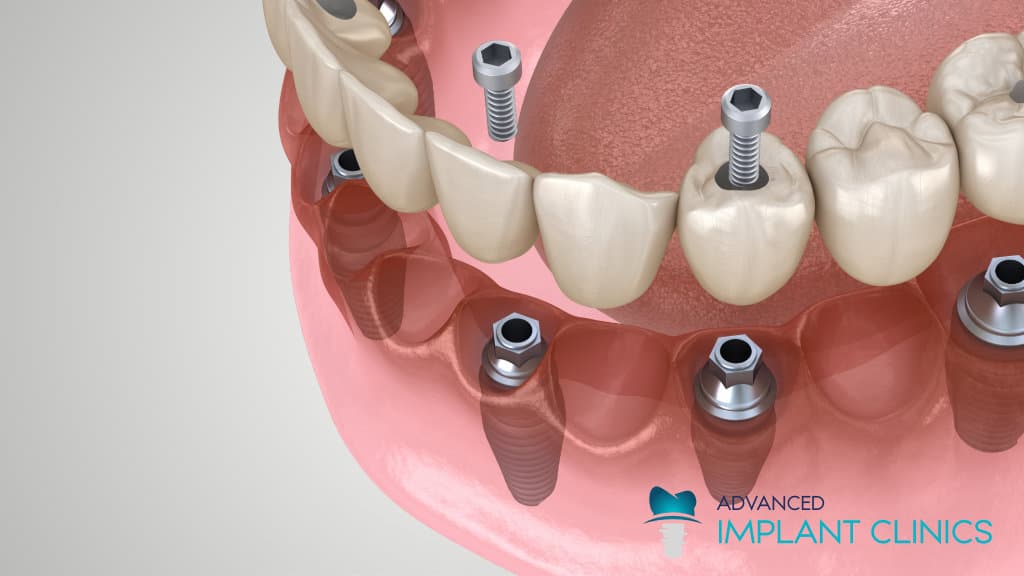
For patients who require full mouth rehabilitation with implants, whether they need to replace all of the teeth in the upper or lower jaw or just a few, this is the ideal option. Four special implants will be inserted by a skilled surgeon, followed by a full arch of teeth. See how the All On 4 technique can give you teeth in a single day.
Multiple Implants
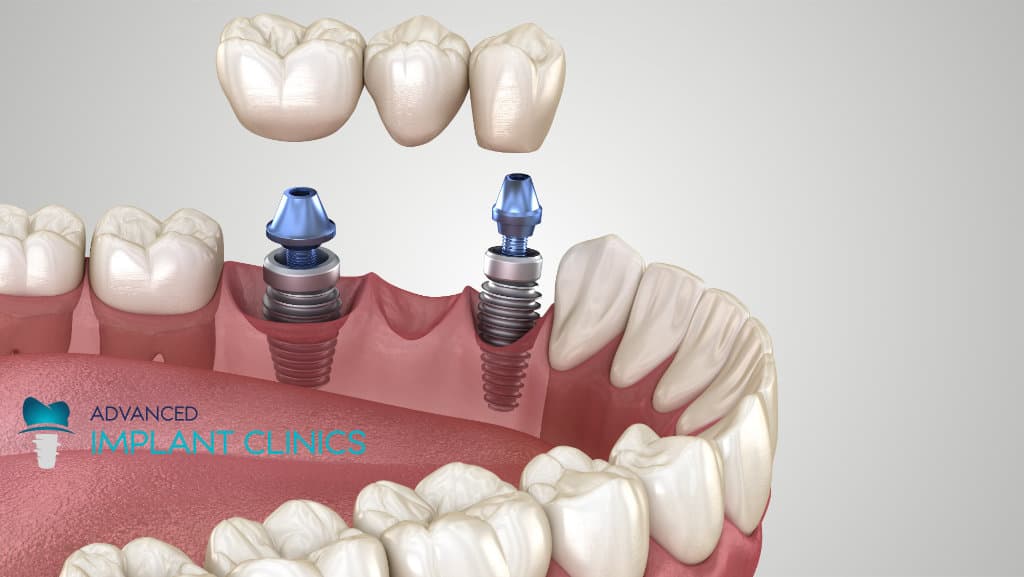
When a patient has lost more than one tooth, but still has healthy gums and surrounding teeth, a multiple implant is the best solution. Two or more implants are placed and a bridge is placed to cover the gaps between the implants, leaving the naturally adjacent healthy teeth intact.
Implant For a Single Tooth
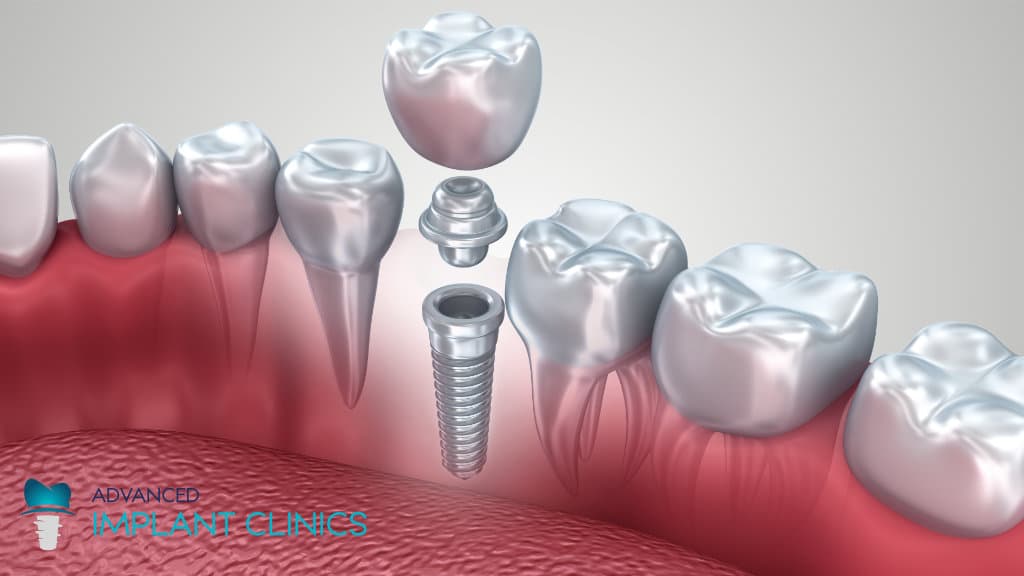
If you have lost a single tooth due to an accident, tooth decay, or periodontal disease, that tooth can be replaced with a dental implant. Your new tooth will look and function just like your other natural teeth.
At Advanced Implant Clinics, we will review your needs and discuss which option is best for you before making a decision.
How the implants are placed
Dental implant surgery is usually performed in stages, with healing time between procedures.
Surgery
The standard dental implant placement procedure includes steps such as:
- Removal of damaged teeth.
- Preparing your jawbone with bone grafts, if needed (see information on bone grafting below in the “Frequently Asked Questions”).
- Placement of a dental implant.
- Shaping, augmentation or improvement of the soft tissues in the area.
- Placement of a special prosthetic component (prosthetic abutment) on the implant to which the artificial tooth will be fixed.
- Fabrication and placement of the artificial tooth (prosthetic work).
The whole process can take from a few days or even months from start to finish, depending on the individual patient’s case. A significant part of this time is devoted to treatment and the growth of new bone in the jaw. Depending on your case, the procedure that has been done, or the materials used, sometimes some steps can be merged.

During the surgery to place the dental implant, your surgeon makes a small incision in your gums and exposes the bone. Using special equipment, a special well is prepared in the bone in the area and the dental implant is placed. The dental implant plays the role of the root of the tooth and is placed entirely within the jawbone.
At this stage, you will still have a gap in the place where your natural tooth is missing. A type of partial, temporary denture can usually be placed for aesthetic reasons if required. You can remove this temporary denture to clean it or when you sleep.
Waiting for bone growth
Once the dental implant is placed in your jaw, osseointegration begins. During this process, the jawbone regenerates and fuses with the surface of the dental implant. This process, which can take up to a few months depending on the case, helps provide a stable base for the implants to function like the roots of natural teeth.
Placement of the abutment
Once osseointegration is complete, you may need additional surgery to place the prosthetic abutment, which is the part of the implant on which the socket (crown) will eventually be placed. This surgery is very minor and is done under local anaesthetic.
To place the abutment – a special prosthetic abutment (healing abutment in the first days and prosthetic abutment afterwards) on the implant:
- Your oral surgeon makes a very small incision in your gums to expose the dental implant.
- The healing abutment is attached (screwed) to the dental implant.
- The gums in the area are shaped and healed around the healing abutment.
- In some cases, the abutment is placed at the same time as the surgical placement of the dental implant. This means that you will not need the extra surgical stage. The abutment is visible when you open your mouth – and will be so until your dentist completes the prosthetic restoration. Some people don’t like this appearance and prefer to have the bracket placed in a separate procedure.
After the healing abutment is placed, your gums will need to heal for about two weeks before the prosthetic abutment is attached to the artificial tooth.
Learn more in the article about the Implant Restoration Process.
Selection of your new teeth
Once your gums are healed, impressions will be taken of your mouth and the rest of your teeth. These impressions are used to make the crown (socket), which is your artificial tooth. The crown cannot be placed until your jawbone is strong enough to support the use of the new tooth.
You and your dentist can choose artificial teeth that are removable, fixed, or a combination of both:
Mobile – removable prosthetic work. This type is similar to a conventional removable denture and can be a partial or full denture. It contains artificial white teeth surrounded by pink acrylic material. It includes in its construction a special attachment and is connected to its complementary attachment placed on the implant (male-female attachment logic). It can be easily removed for repair or daily cleaning.
Fixed – stationary prosthetic work. In this type, the artificial tooth is permanently screwed and fixed to the special prosthetic abutment located on the implant. You cannot remove the tooth for cleaning or during sleep. Most of the time, each artificial tooth (socket) is attached to its own dental implant. However, because implants are extremely strong, a few implants restore many teeth that are bridged together.
Complications after placement
Although the risk of complications is zero, whether you have dental implant surgery in one stage or multiple stages, you may experience some of the following typical side effects and problems associated with any type of oral surgery, including:
- Swelling of your gums and face
- Bruising of the skin and gums
- Pain at the implant site
- Minor bleeding
To manage pain at the implant site, you may need medications, such as pain medication after surgery. In some cases, the doctor may recommend antibiotics or an anti-inflammatory medicine. If the Tooth Implant Pain, swelling or any other problem worsens in the days after surgery, contact your dentist.
After each stage of surgery, you may need to eat soft foods while the surgical area is healing. Usually, the implant surgeon uses sutures made of materials that do not retain germs. After a few days, they are easily removed by your dentist.
Regarding complications and the possibility of failure, learn all about them in our guide to Problems with Dental Implants.
Photos before and after placing implants
The success rate of implants
The vast majority of dental implants are successful. The success rate of implants is 98% in the first 5 years, while at 15 years the rate ranges from 82-95%, according to data from the American Association of Implantologists (AAID). High success rates depend directly on the detailed planning of the surgery and the prosthetic restoration.
However, sometimes, the bone does not adequately integrate the metal implant. Smoking or inadequate cleaning, for example, may contribute to implant failure and complications. If osseointegration is not done adequately, the implant is removed, the bone is cleaned and you can try the procedure again in about three months.
Implants can last permanently. But it all depends on the care you take for your implants and your overall oral health. So the answer to the question “how long do dental implants last?” is that with proper care, they will stay in your mouth forever and improve your quality of life.
Why choose us for your implants
At Advanced Implant Clinics, we are committed to providing you with exceptional and innovative implant technology. We have become one of the leading dental implant clinics in the country, with international partnerships, through our commitment to developing high-quality, innovative, safe and effective dental implants. We conduct a rigorous quality control process to continue to achieve our mission. It is no coincidence that our clinic is a member of the MALO DENTAL International Network, the only one in Greece.
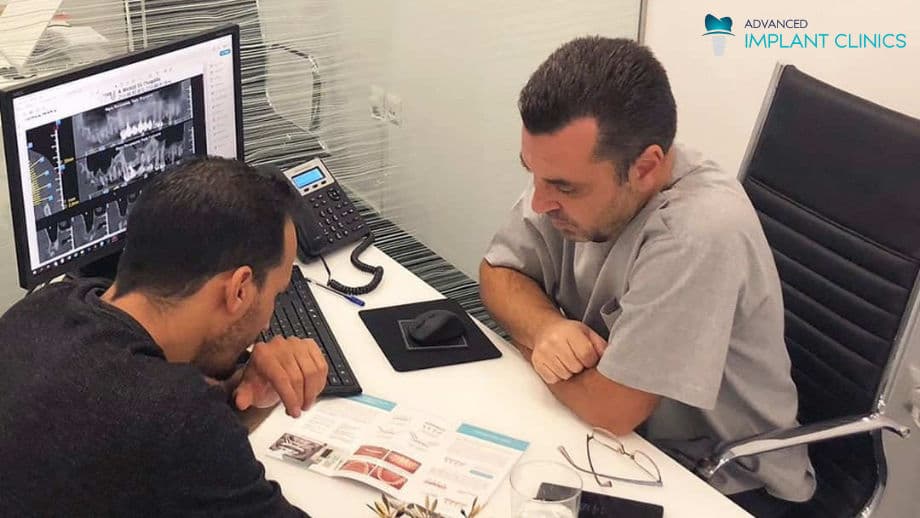
For years we have been using only the highest quality materials and our scientific staff is exclusively focused on dental implants. Read our article on the most trusted brands of dental implants. We also believe that our dedication to the field of implant dentistry and to our patients, as well as the affordable prices we offer, is why so many people choose Advanced Implant Clinics for their treatment.
Read on for the most common questions and answers about dental implants, and feel free to schedule a free consultation with us before you go elsewhere. If you have more questions about dental implants, we’ll answer them all during your visit.
Contact us to schedule an appointment at our clinic in Glyfada, Athens to discuss the options that fit your finances and needs.
Frequently Asked Questions
How much do dental implants cost?
The number of implants, the quality of the materials, whether a bone graft or other treatments are necessary before placement, as well as other factors, affect cost. Costs vary depending on the patient’s health and needs. At your initial appointment, we will evaluate your health and give you a quote that includes the total cost of the procedure from beginning to end. Remember that many dentists’ initial quotes only include the price of the implants. Asking if this is the final price and if the prosthetic work is included in the quote from a dentist is crucial to avoid any unpleasant surprises.
At our clinic, we guarantee the best medical implant materials at competitive prices along with high-quality services. This will be evident at the initial consultation.
Ask us about our financing options to replace missing teeth. These include easy monthly payments, interest-free installments, and other options that guarantee high-quality products and services and are covered in the article Prices and Cost of Dental Implants.
How is the pain of dental implants treated?
The majority of patients are surprised by how little pain they experience following the placement of a dental implant. If you feel additional sedation will be necessary to calm you down, you can request it or the procedure can be performed with only a local anesthetic. Once the anesthesia wears off, there shouldn’t be much discomfort. If necessary, your dentist can write you a prescription for painkillers, but most of the time, one is sufficient. Contact your dentist right away if the pain is intolerable, persists for more than a few days, or if you experience any of these unanticipated issues. See our guide to Implant Pain for more information on this subject.
What is the difference between a dental implant and a bridge?
Dental implants are screwed – placed into the jawbone to hold a new artificial tooth in place, while bridges use the surrounding teeth as a support for an artificial tooth or teeth. Sometimes, certain healthy parts of your natural teeth have to be ground down to support the bridges, while dental implants do not harm the surrounding teeth.
How long does the whole procedure take?
The time it takes to place dental implants varies from person to person. The usual time is between three and six months, but this can be longer depending on your individual needs and whether you require any preparation work such as extractions or bone grafts.
What are the risks of dental implants?
As with any surgical procedure, there is a possibility of infection, pain and inflammation. However, negative effects are rare and usually minor if they do occur. Your dentist will advise you on how to manage these risks.
What diet should I follow after having dental implants?
For two days after surgery, drink fluids and eat soft foods such as yogurt, cooked cereals, soups, soft cheese, soft cheese, ice cream, mashed potatoes, blender-pulled fruit, and creams.
On the third day after surgery, eat soft foods that do not require a lot of chewing such as cooked pasta, macaroni and cheese, soft sandwiches, poached eggs, stewed eggs or scrambled eggs.
Avoid crunchy or hard or sticky foods such as nuts, rice, pizza, hamburgers, popcorn, candy, and spicy or acidic foods.
Most people resume their normal diet seven days after surgery.
How soon after a tooth extraction can I get an implant?
In some cases, it is possible to have dental implants placed the same day your dentist extracts your teeth with immediate implant loading. With traditional protocols we wait 6 to 8 weeks after an extraction in order to place the implant. If a bone regeneration procedure is required prior to this, the time is increased.
Is there a cure for failed implants?
Although implant failure is rare, it can happen. The jawbone usually integrates easily with the dental implant. Extremely few cases of rejection have been reported in rare allergies to the titanium alloy of which the implant is made.
Another reason why an implant could fail is if it is not properly cared for after surgery. Without good oral hygiene, dental implants fail and eventually fall out just like your natural teeth.
Sometimes it is possible to save a dental implant, provided that help is sought quickly enough, with regeneration of the surrounding bone and gums. However, a failing implant often needs to be removed and the area healed. A new dental implant can then replace it.
How long does it take for dental implants to heal?
The implantation process involves different steps. You may need more than one stage of treatment. The healing period varies, depending on your health, how many teeth need replacing, and other factors. However, on average, the osseointegration process generally takes 3 to 6 weeks.
What can’t you do after implant surgery?
To start, quit smoking altogether, or at the very least, cut back. The gums are damaged by smoking. Applying hot compresses to your face after placement is also not advised because they may exacerbate swelling. Avoid chewing mouthwash and drinking liquids through straws. By doing this, pressure is applied to your mouth, which may cause bleeding, delay healing, and dislodge the blood clot keeping the wound closed. Read our article on Tooth Implant Pain to learn how to prevent painful situations.
Will I be left without teeth after having implants?
No, you will not be left without teeth. You will be given temporary dentures or a temporary crown or bridge to wear during treatment. These temporary teeth are made, with impressions taken by the prosthodontist before teeth extraction and implant placement. If you already wear dentures then they may be able to be adjusted so that you can use them while the implants are being fitted.
Can I have implants if I have partial or full dentures?
Dental implant options are frequently chosen by people who wear partial or complete dentures. With connectors that “snap” into your implants, straightforward dental implants can assist in holding the removed denture in place. In this manner, the full or partial denture is kept in place and less adhesive is required. Additionally, you can use implants to support a fixed bridge in place of a mobile denture. Your dentures could be transformed by the dentist into overdentures that are held in place by unique attachments to the dental implants. However, due to the requirement that your current dentures should be in excellent condition as well as other factors, this is not always possible. If this solution works for you, your dentist will let you know.
Is it difficult to clean the implant teeth?
No. However, cleaning is important if you want to have a long-lasting, successful implant. Our dental team will provide you with detailed advice on how to care for your implants. Cleaning around gums that are attached to implants is no more difficult than cleaning on natural teeth. However, there may be areas that are difficult to reach and we will show you how to clean them. After placement, it’s important to visit your dentist for regular check-ups, but our dental team will let you know about this.
Previous gum disease (periodontitis) when I had my teeth, is it transferred to the implants?
Yes, if you don’t properly maintain your implants. You won’t experience any issues if you keep them clean and schedule routine checkups with the dentist. Smoking has an impact on the implants’ health as well. You might need to take better care of your implants if you smoke. Unfortunately, peri-implantitis, or inflammation of the gums and bone surrounding an implant, can be brought on by oral pathogens, just as it can be with natural teeth in the case of periodontitis. This is true even though implants are made of metal and are not susceptible to tooth decay.
Can I remove teeth if they are fixed to implants?
Most artificial teeth attached to implants can only be removed by a dentist. However, if you have removable dentures attached to implants with connectors, you will be able to remove them for cleaning.
My implants will they be visible?
The look and feel of implants are similar to those of natural teeth. Nobody nearby will be aware that you have implants. If someone does notice, it’s likely that your dentist didn’t use high-quality prosthetics. Such cases, typically from foreign nations that advertise “cheap” implants, have been seen in our clinic.
Will I need an implant for every missing tooth?
If only one tooth is missing, you will only need one implant to support it. If you have several missing teeth and they are next to each other, you could place an implant for each tooth, although this is no longer considered a good solution. You may also find that two or more implants will be able to support a bridge that will cover the gaps between the teeth. Your dentist will advise you on the best option for you.
What if I have an accident?
Implants and the teeth they support can be damaged by an accident, just as can happen with natural teeth. If you participate in sports that involve contact it is important to wear the special sports mouthguard.
If only the artificial teeth are damaged, they can usually be removed from the implant and replaced.
If the titanium implant is damaged and cannot be repaired, it can be safely left in the jaw if it is difficult to remove. Another implant can be placed next to it to replace the damaged one.
What happens if the implant does not integrate with the bone?
This happens relatively rarely when all specifications in terms of technique and case selection are met. If the implant becomes loose during the healing period, or after, it is removed. After removal of the failed implant, once the jawbone has healed, a new implant will be placed in its place.
How long do dental implants last?
Unlike natural teeth, dental implants do not face the risk of decay. However, gum health is vital to maintaining the success of the implant. Proper care at home by the patient and regular cleanings and check-ups in the office are essential elements for the viability of dental implants. Implants, with proper care, can last a lifetime.
What if I want metal-free implants?
Forget it. There are no “metal-free” implants. Almost all materials used for tooth replacement have some kind of metal ions in them. Dental implants are made of titanium alloy, which is highly biocompatible and allergy to titanium is extremely rare! Currently, there are no proven alternatives to titanium dental implants.
What is All-on-4®? Can I really get teeth in a day?
All-on-4® is a treatment procedure that is implemented in just one day and involves replacing all the missing teeth in a jawbone using only 4 implants. You enter the surgery with no teeth and leave with a full set of dentures. See how you can get teeth in a day.
Are dental implants as strong as natural teeth?
Yes, and they’re certainly even stronger when they replace teeth that have decayed and may have been quite brittle.
Are there any side effects to dental implants?
You may experience few, if any, side effects that are common after any surgery, such as low-level pain or swelling. If a dental implant is placed incorrectly, then it is possible to experience numbness or possibly severe pain. If symptoms continue for more than a few days, then you should inform your dentist. It is likely to settle down, otherwise the implant may need to be removed. This is extremely rare for this to happen, as the risks are minimized through careful planning before surgery using x-rays and CT scans to avoid any nerves and blood vessels.
Is age a factor in tooth placement?
Age is generally not a factor for placing dental implants. A young person can have dental implants as soon as their bones stop growing, usually by the age of eighteen or twenty. Older people are usually able to get implants, provided they do not have any major medical problems. However, bear in mind that the rate of healing slows down with age and the jawbone becomes weaker due to tooth loss.
Should I choose implants or dentures?
Many people are uncomfortable with traditional dentures that slip or move. Especially after they have been worn for a few years, the jawbone atrophies and offers less retention for dentures. This cannot happen with dental implants, where the prostheses are fixed to the implants and will not be able to move.
Dental implants have the appearance and function of natural teeth. They do not slip or move when you eat or speak, and the prosthetic work stays firmly in place. Plus with proper care they last a lifetime.
When are mini-implants a good choice?
Mini dental implants are shorter in length and thinner than traditional dental implants. They can be a good option for patients who do not have sufficient bone density or mass to support traditional dental implants and who cannot undergo bone graft surgery to create bone in the jaw. They are usually considered a temporary solution.
How safe are dental implants?
Tooth implants have been proven safe and effective for restoring missing teeth and have been in use for more than 50 years. Today, thanks to advances in technology, dental implants are one of the most reliable ways to replace missing teeth. However, not only the quality of the materials, but also the technological equipment, as well as the expertise and specialization of the Clinic’s medical staff, play an important role in the success of implants.
The implants are made of titanium, a material that is biocompatible and accepted by our body and is a strong and stable basis for replacing missing teeth. The natural bone “locks” the implant by growing on its surface. This process, known as osseointegration, provides the stability and strength needed for the daily use and function of the teeth supported by the implants.
It is common for patients to ask what is the best implant, wanting to have a solution that will last permanently and not cause problems in the future. However, an important factor in the safety and durability of implants is the quality of the material. To be sure of the quality of the implant that will be placed, ask your dentist to provide you with the implant’s certificate of authenticity and the guarantee that comes with it, which should be a lifetime guarantee.
If you are wondering about the quality of the materials read what are the best dental implants and why in our clinic we recommend the implant system of the industry’s leading manufacturer Nobel Biocare, offering high quality services at affordable prices.
What is computationally guided implant placement?
With the use of new technology, through Digital Planning and Computer Guided Implant Placement, the surgical placement of implants is a safe and predictable procedure when performed by trained and experienced dentists.
At Advanced Implant Clinics, each case is studied using a special Dental Digital Tomography by an Implant Surgeon. The placement is safely guided by a digital surgical guide using modern 3D Printing technology.
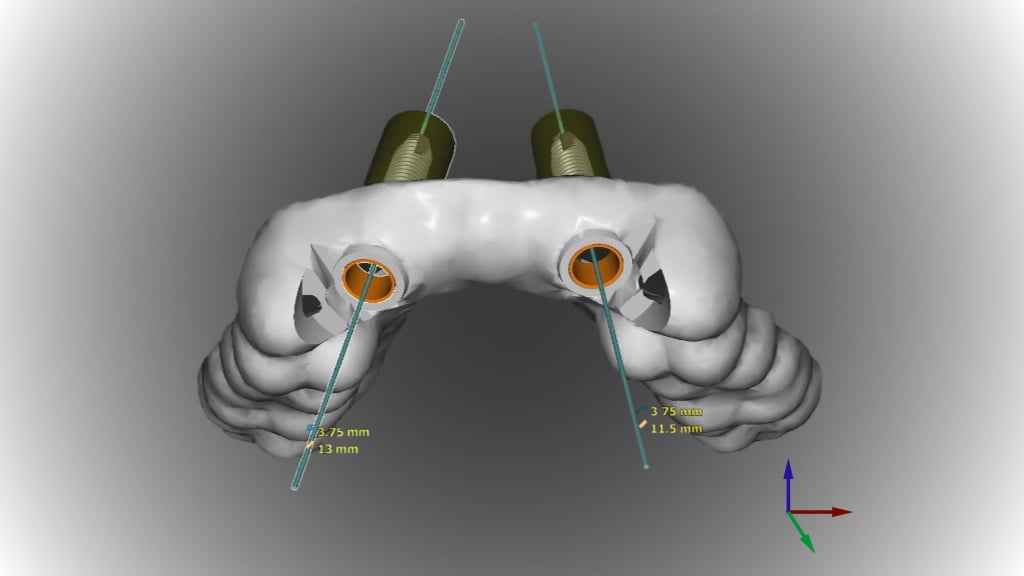
Restoration of dental implants using the latest technology.
The planning and adjustment of the Prosthetic Restoration is carried out by a qualified Prosthodontist. Modern Dental Implantology requires the collaboration of dental specialties. Dental implant restoration is a safe, daily procedure that requires a formally trained dental team. At Advanced Implant Clinics we use the most Advanced Implantology Techniques. Our dentists are available to discuss with you and recommend the best treatment for your case.
When do you need a bone graft in implants?
If the correct procedures are followed when extracting damaged teeth this stage is usually not required. If the bone in your upper or lower jaw does not have the minimum dimensions required, you may need a bone graft before you can have dental implant surgery.
Bone graft surgery restores bone loss after an accident, gum disease, or after tooth loss. The implant must be in the correct position so that the prosthetic work is optimal for both chewing function, aesthetics and facilitating oral hygiene. If the bone and gum in the area where the implant should ideally be placed has atrophied, reconstruction techniques will be required. Bone grafts can create a firmer foundation for the implant that ensures its long-term success.
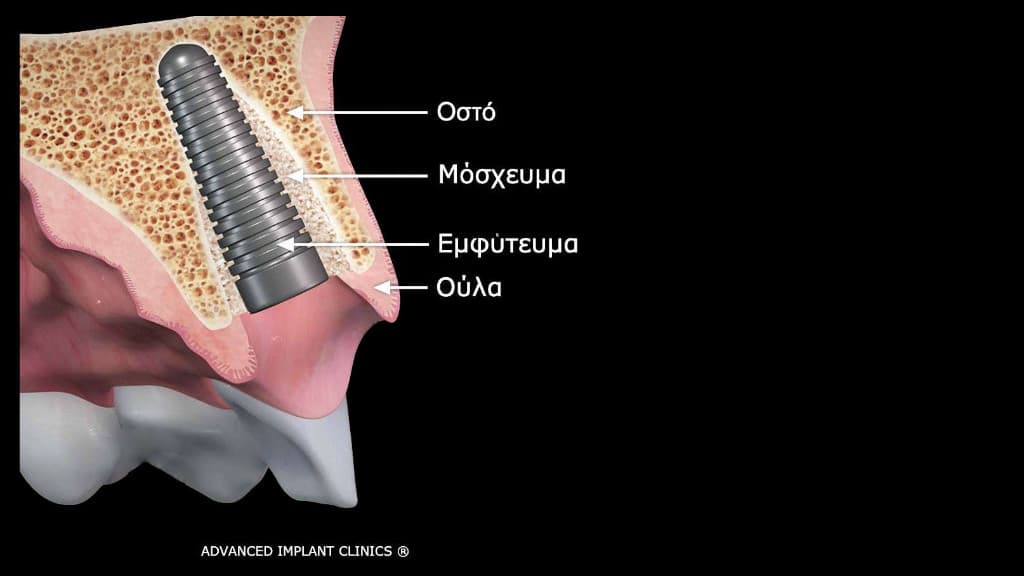
There are many bone graft materials and surgical techniques that can be used to regenerate the bone and gums of the implant site. Options may include a natural or a synthetic bone graft, bone substitute that can provide support structures for new bone growth. Talk to your dentist about the options that best suit your situation.
It may take a few months for the transplanted bone to grow enough to support a dental implant. In some cases, only a small bone graft may be needed, which is placed during implant surgery. The condition of your jaw determines how the procedure will proceed.
